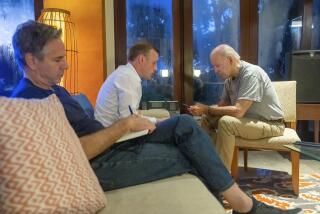U.S. Official Sees No Summit Surprises : Diplomacy: Recalling the startling Reykjavik summit, both sides have agreed that no decisions will be made.
- Share via
SYDNEY, Australia — In President Bush’s Mediterranean meeting next month with Soviet President Mikhail S. Gorbachev, there will be no surprises like those at the meeting of U.S. and Soviet presidents three years ago in Iceland, a senior State Department official said Thursday.
The official, traveling on Secretary of State James A. Baker III’s airplane on the way to meetings in Australia, said Washington and Moscow have agreed in advance that no decisions will be made when Bush and Gorbachev meet aboard U.S. and Soviet warships Dec. 2-3.
The October, 1986, meeting between Gorbachev and President Ronald Reagan in Reykjavik, Iceland, was also billed as an informal meeting, not a summit conference. But the two leaders came close to a sweeping arms control pact before the talks broke down because of a dispute over the U.S. “Star Wars” missile defense program.
“Both sides here are making it clear in advance to a much greater degree than was done before the Reykjavik meeting that it is not the purpose of their meeting (to make decisions), and it has been made crystal-clear in terms of arms control,” the official said.
Baker talked by radiotelephone with Soviet Ambassador Yuri Dubinin as he flew over the Pacific to complete some of the details for the Mediterranean meeting, details that had not been worked out before the session was announced Tuesday in Washington and Moscow, the official said.
“There were a few loose ends that needed to be tied up,” the official said. “I feel confident that things are proceeding well in terms of wrapping up those loose ends--logistical loose ends.”
Bush will be prepared to support Gorbachev’s economic reforms if the Soviet leader wants the help, the official said, though Moscow is not likely to request financial aid from Washington.
“What we are talking about is the willingness to provide technical advice if it is solicited and if it is wanted,” the official said. “If they want it in a confidential way, we will do it in a confidential way.”
Baker and Defense Secretary Dick Cheney arrived in Sydney on Thursday in separate U.S. Air Force jet transports. They are scheduled to confer today and Saturday with Australian Foreign Minister Gareth Evans and Defense Minister Kim Beazley--the annual U.S.-Australia security cooperation conference.
Baker also plans to attend a 12-nation planning session Monday and Tuesday in Canberra for a proposed Pacific Rim economic forum.
Baker arrived in Sydney without his top Asia expert, Assistant Secretary of State Richard H. Solomon, who missed the plane after a refueling stop in Pago Pago, American Samoa.
Solomon and three journalists, Alan Elsner of Reuters news agency, David Ensor of ABC and Christopher Ogden of Time magazine, left the airport to tour the island. The refueling operation took less time than had been scheduled, and the four were not back when Baker was ready to go.
They caught a ride with Cheney, who had stopped for fuel in Pago Pago shortly before Baker completed his stop.
During an earlier refueling stop in Hawaii, Baker conferred by telephone with Israeli Foreign Minister Moshe Arens and Egyptian Foreign Minister Esmat Abdel Meguid in a continuing effort to revive Israeli Prime Minister Yitzhak Shamir’s plan for elections in the Israeli-occupied West Bank and Gaza Strip.
Later, talking with reporters on his plane, Baker said progress has been slow in connection with his Middle East initiative.
“As long as we are talking, I would suppose that in some way you might characterize that as progress,” Baker said. “It means that the efforts are still alive. I want to continue to try as long as we feel there is the faintest hope.”
More to Read
Sign up for Essential California
The most important California stories and recommendations in your inbox every morning.
You may occasionally receive promotional content from the Los Angeles Times.










